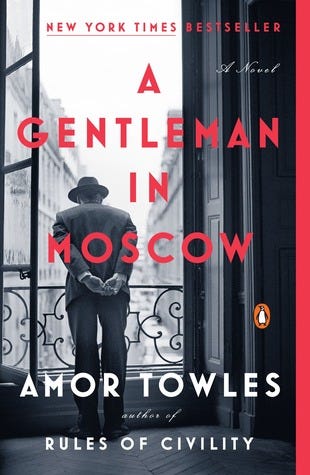With all that’s going on in the world, is there still space for book reviews? Yes.
On January 17, 1991, the day the Gulf War began, I was an English major at the University of Waterloo. I remember my American Lit professor, Ken Ledbetter, asking the class, “How are you doing? Is this your first war?” He wasn’t that flip, but he wasn’t exactly earnest. “Don’t worry, you’ll get used to it.” A lot of what we were reading included reflections on World War One. Ledbetter was my favorite prof.
The book about Russia, below, is also from that period, post-Revolution, post-Great War, and we are all turning our thoughts to Russia again with this new war, but this book has nothing to do with that. It’s quite fun in its own right.
The Marilynne Robinson novel below first came to my attention in 2006, when the New York Times published a feature on the “best novels of the past 25 years.” Only two female writers made this list. Toni Morrison’s Beloved was ranked best novel of the 1980-2005 period. Marilynne Robinson’s Housekeeping was bunched up with the dudes. I wrote a reflection on the list and the discussion about the list the Times also published.
Was it worth the wait? I should have read it much, much sooner.
Cherie Dimaline’s novel is required reading.
So it goes.
A Gentleman in Moscow
by Amor Towles
2019
Recently I have seen multiple references to this 2016 novel, which I didn’t take notice of when it first appeared, and then it was chosen by my neighbourhood book club. This was weeks before the Ukraine war. I listened to the audio book, which slid by like a ballerina on ice skates. Interesting image, eh? It’s a novel that combines high culture with a straight plot line, though the plot is hard to summarize and may only seem straight once you get to the end.
In the years after the 1918 Russian Revolution, an aristocrat is sentenced to house arrest in a ritzy Moscow hotel. He easily could have been shot, but he published a poem years earlier that suggested some sympathies to the Reds. And he returned to Moscow from Paris, instead of remaining abroad, where he had gone years earlier after shooting an aristocrat.
There are stories within stories here, yes, like Russian dolls. Why do we care about this guy? Well, he’s interesting, well read, down-to-earth, stuck in a predicament, a witness to history. Is that enough? No. He’s charming, but that’s not enough, either. What makes us care, is he is a friend of children, a super rare quality in any novel. He befriends a brilliant girl (or does she befriend him?), which later leads to, well, other things (no, not sex). Not giving away plot points here.
The ritzy hotel suffers the indignities of Communism, but it also maintains its prominence. Our lead is stuck within its walls, but the world comes to him. He’s an unusual character living through unusual times. And now, aren’t we all?
Housekeeping
by Marilynne Robinson
1980
I listened to this as an audio book without any knowledge of the plot, and over and over it surprised me. I expected some kind of domestic drama, given the title, and I guess it is, but it’s a bit of a ghost story too, a tale of the past haunting the present, a shadow of spookiness that just gets darker and darker.
A man drives a train off of a bridge and the train disappears into the lake below. The novel follows the consequences, or at least the subsequent events, in the lives of his wife, daughters and grand-daughters. Women and girls dominate the dramatis personae.
And Robinson has a gift for crafting memorable, choice turns of phrases. He’s how the narrator describes the death of her grandmother: “After almost five years, my grandmother one morning eschewed awakening.” Note the excellent use of active voice—strong, powerful, unusual verb. Wry understatement. Nice.
The audio version I listened to included an interview with the author, and she said every time she tried to introduce a male character it just didn’t work. The story of these women and girls and their haunted fates is made all the more powerful without male interference. Various social levers and customs available to women come all the better to the fore.
What is a house and how do you keep it? The events of the novel circle around this question. The first household crashes with the train, then wife raises daughters who are odd and depressed, one returns with two daughters of her own and then commits suicide. The fate of these two daughters is the bulk of the book.
The lake, the town, the train, the house—the contained environment makes the action seem almost like a play. In the interview, the author said she wanted to write a metaphorical novel. She succeeded in spades.
The Marrow Thieves
by Cherie Dimaline
2017
Strange and shocking. I knew the premise of the story before starting it, and if you can get your head around that, then the book won’t shock you worse. Not going to reveal the premise here, let the book reveal itself bit by bit.
What we have here is a chase narrative. One group of people are being hunted down by another. The date is the future, and the world has suffered massive environmental catastrophe. Indigenous people are being hunted by non-Indigenous people because—okay, I’ll tell you—non-Indigenous people have lost the ability to dream, and they are going crazy. The marrow in the bones of Indigenous people contains a cure.
The power of the metaphor of the story is the parallel between the novel’s hunt and the horrors settler-capitalism has inflicted on Indigenous societies and IRL (i.e., now and back to 1492). In the novel, Indigenous bodies are hunted for the cure. In our own sad realities, the land-centred Indigenous cultures on Turtle Island and world-wide could still be the preventative cure.
In novel's post-apocalyptic world, the reader follows a group through the forest as they seek safety. In a series of flashbacks, we brought up to speed on the state of the world. Events unfold as characters seek their destiny and the plot moves towards its climax. For this reader, the horror of the premise overwhelmed anything interpersonal, though there are tender moments and memorable peeps. Heaven help us all.






